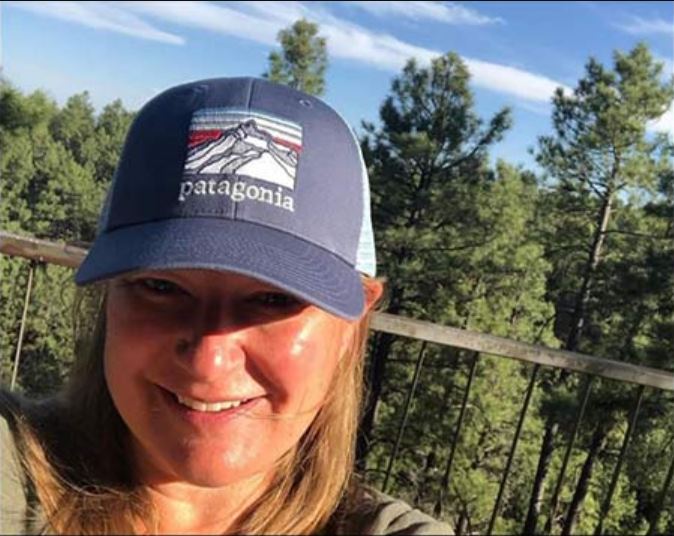
by Terri Jo Neff | Aug 23, 2021 | News
By Terri Jo Neff |
On Monday afternoon, Dale Henson and his attorney are slated to appear before a federal magistrate in Phoenix to argue why Henson, a Chandler resident, should be released from detention to await trial on 58 counts related to financial crimes, including money laundering and defrauding two government agencies.
Dale Henson and his wife Zoila Villa Henson were arrested Aug. 18 after a 17-month FBI investigation into $1.2 million of allegedly falsified medical billings to the Arizona Health Care Cost Containment System (AHCCCS). The investigation also found allegedly illegal activity connected to the couple’s use of $150,000 in COVID-19 Economic Injury Disaster Loans from the Small Business Administration.
Court records show Dale Henson was ordered at his initial court appearance to be held by the U.S. Marshals Service until a formal detention hearing on whether he poses a flight risk, as Assistant U.S. Attorney Monica Klapper contends. That is what U.S. Magistrate Deborah Fine will decide Monday.
Zoila Henson’s name does not appear on the court’s detention hearing calendar this week, possibly because of her status as a Mexican citizen.
The arrest of the Hensons, both age 53, was announced Aug. 20 by the U.S. Department of Justice. However, AZ Free News is aware of several search warrants executed last fall in connection to the Hensons and those they did business with. Some of the searches were conducted at commercial locations while others took place at residences across Arizona.
According to the Aug. 3 indictment, Henson Family Services LLC and Henson Holdings LLC were hired in 2019 by a behavioral health facility in Mesa to handle the facility’s medical billing. But the Henson entities are alleged to have billed and received payment from AHCCCS on 25 occasions from August 2019 through April 2020 for services which were not rendered to the facility’s patients.
In addition to the 25 AHCCCS fraud counts, the indictment includes 25 counts of aggravated identity theft for using names and birthdates of the facility’s clients on the fraudulent billings, 6 counts of money laundering, and 2 counts of wire fraud. The wire fraud is related to the alleged misuse of two COVID-19 government loans issued to the couple’s businesses.
It is unclear how AHCCCS approved the couple or their businesses to work with Arizona healthcare companies given that the State of Nevada terminated a contract with Henson Family Services, Dale Henson, and Zoila Henson in January 2019. A Nevada Office of Inspector General report also shows three-year sanctions against all three by the Nevada Medicaid system.
But by mid-2020, the couple was actively engaging new clients in Arizona. Arizona Corporation Commission (ACC) records showed Zoila Henson as statutory agent for 24 businesses, the majority of which appear to be healthcare related.
Among the businesses are Chandler-based Mountain View Residential LLC, Apache Health LLC in Apache Junction, and Cypress Health and Wellness Spa.
ACC records show Cypress Health was owned by Dale Henson, Amber Scott, and the late-Kacey Bowers. Bowers also co-owned Babbitt Bowers Behavioral Health Services LLC with Kristy Babbitt, another business which lists Zoila Henson as statutory agent.
In March 2020, Dale Henson uploaded several photographs of his Chandler residence to his Facebook page. That same month, the couple issued a $309,103 cashier check to Great American Title, which is one of the six acts of money laundering charged in the criminal indictment.
Three of the other transactions involve more than $312,000 in checks written to the Wisconsin-based Lutheran Indian Ministries. The other two money laundering charges relate to $11,390.73 paid to Nordstrom department store in February 2020 and a $15,000 check written to “K.B.” in March 2020, according to the indictment.
Dale Henson will be represented at Monday’s detention hearing by Michael Kimerer. Among the arguments put forth by Klapper of the U.S. Attorney’s Office is that pretrial detention “is appropriate when the United States demonstrates either flight risk or danger to the community.”
Such a risk is posed by Dale Henson, according to Klapper, in part because of recent real estate transactions by the couple, including the $1.3 million purchase of a home last year which they recently sold.
“The Hensons also purchased five other pieces of residential or commercial real estate in the Phoenix metropolitan area, valued at millions of dollars – all of which was recently sold,” Klapper wrote to the court, adding that the couple have “few remaining connections to Arizona and have many connections to Mexico, where Zoila Henson is a citizen.”
The proceeds of those sales have been captured by state authorities pending forfeiture, according to the U.S. Attorney’s Office. The capture appears to be related to a separate state investigation into healthcare fraud.
A review of Dale Henson’s Facebook page reveals a public post in which he notes having a brother-in-law who is a captain with Aeromexico. Information on Zoila Henson’s attorney was not available as of press time.

by Terri Jo Neff | Aug 23, 2021 | News
By Terri Jo Neff |
A new state program announced last week by Gov. Doug Ducey will provide up to $10,000 to assist small businesses impacted by Mother Nature and her aftermath, as well as those still reeling from the COVID-19 pandemic.
Ducey’s Aug. 20 announcement of his Back to Work Small Business Rehiring and Retention Program came the same day he toured flood-ravaged Gila Bend. But while the program is being heavily touted in areas hard hit by flooding and wildfires, the funds are also available to thousands of other Arizona small businesses.
And by small, the governor means between 5 and 50 employees for businesses impacted by flooding or wildfires, and between 5 and 25 for all others. In addition, the business must be owned and operated in Arizona, have an incorporation date before Jan. 1, 2020, and rent or lease a physical location in Arizona.
“We want to make sure they have the resources needed to grow and serve their customers, and our new Small Business Rehiring and Retention Program will do just that,” Ducey said of the funding for employee hiring / signing bonuses, relocation bonuses for employees moving to take an open position, and employee retention bonuses.
One of those small business owners is Lilly Hritz, proprietor of Lilly’s Tombstone Memories located on historic Allen Street in Tombstone. Hritz’s business was hit hard by the pandemic, which essentially wiped out nine months of tourism in 2020 and continued to keep many customers away during the traditionally busy first quarter of this year.
That drop off in revenues and available work hours has made it difficult to find and keep quality workers, Hritz told AZ Free News.
“I am excited to about Governor Ducey’s new program. It will make it easier for me to retain the staff I have and help me attract new employees as we prepare for the upcoming tourist season,” said Hritz. “And that will give me the peace of mind to refocus on our expansion plans which had to be put on hold when COVID hit.”
Ducey’s new program has also received bipartisan support among lawmakers, including praise from Rep. Jeff Weninger (R-LD17) and Rep. Aaron Lieberman (D-LD28).
“Effectively hiring and maintaining employees is crucial for the success of any business, but especially the smaller businesses,” said Weninger, himself a small business owner in Maricopa County. “This new program will help them continue to bounce back from the pandemic and extreme weather, and they’ll have the opportunity to expand operations.”
Lieberman is also a business owner, and said he was happy to work with Ducey’s office on the development of the program.
“Small businesses create jobs, support communities and serve Arizonans’ needs,” said Lieberman. “I’m thrilled to see the launch of the Small Business Rehiring and Retention Program and look forward to all it will do to foster small business growth and help Arizona workers.”
The Small Business Rehiring and Retention Program is a new component of Governor Ducey’s Arizona “Back to Work” plan announced in May. Information about the program is available at https://www.azcommerce.com/covid-19/financial-resources/back-to-work-small-business-hiring-and-retention-program/

by Terri Jo Neff | Aug 22, 2021 | Education, News
By Terri Jo Neff |
Thursday’s announcement by Gov. Doug Ducey and House Speaker Rusty Bowers that Arizona “wholeheartedly welcomes our share of the refugees” fleeing the Taliban regime in Afghanistan is shining a light on a little known state program that provides financial, educational, and cultural support to refugees.
“As refugees come and find homes in states across the nation, we welcome them to our state full of opportunity and choice, and we’re working closely with federal and state officials to offer them safety in Arizona,” the joint Ducey-Bowers statement reads.
Those efforts will be made easier through the Refugee Resettlement Program (RRP) run by the Arizona Department of Economic Security (DES) which aids refugees as they adjust to life in the United States. The objective is to respect a refugee’s culture and language while helping them reach self-sufficiency as quickly as possible, according to the DES website.
Transition efforts are further assisted by local nonprofit Refugee Resettlement Agencies (RAs) which provide frontline essential services during a refugee’s first few months. RAs also link refugees to federally-funded programs such as Employment Services, English Language Training, Refugee Cash and Medical Assistance, and Case Management.
The U.S. Immigration and Nationality Act provides several criteria for who qualifies as a refugee. For most Afghanistan nationals, the applicable criteria will likely be the provision for any person outside the country of their nationality, who is unable to return to that country due to a “well-founded fear of persecution.”
Many of the Afghans coming to the United States are expected to receive a Special Immigrant Visa (SIV) connected to their past service to the U.S. government and military during the 20-year war which included Operations Enduring Freedom and Freedom’s Sentinel. SIV visas apply also to one’s spouse and children.
“They helped out military members in their country, and now we stand ready to help them in ours,” Ducey and Bowers noted in their statement.
The U.S. Department of State also recently announced another program, one which pertains to Afghans who worked for private American contractors, as well as in-country programs funded by the U.S. It would also apply to Afghani employees of media outlets and those who worked for nonprofit, non-governmental organizations which are headquartered in the U.S.
Before releasing his statement about refugees, Ducey expressed concern with the unfolding Taliban expansion in Afghanistan after the U.S. Air Force released a photograph showing 823 Afghans -men, women, and children- crammed in the cargo hold of a C17 flying out of Kabul. The governor pointed the finger of blame for the chaos directly at the top man in the White House.
“As we approach the 20th anniversary of 9/11, the events unfolding in Afghanistan represent complete negligence and an abdication of responsibility by President Biden,” Ducey tweeted on Aug. 16. “If the promise of President Biden was that he would restore America’s standing in the world, he’s just done the exact opposite.”
Government statistics show more than 120,000 people died during the U.S. war in Afghanistan, which included Operations Enduring Freedom and Freedom’s Sentinel. Among the dead are 2,443 U.S. military members, 66,000 Afghan military and police, roughly 47,000 local citizens, nearly 3,850 U.S. citizens working in the country, and more than 1,100 military members from other nations.
Meanwhile, many U.S. service members and defense contractors who deployed to Afghanistan between 2001 and 2021 are speaking out about the problems now facing that country. One such Veteran is Arizona lawmaker Rep. Steve Kaiser, who served with the U.S. Army in Afghanistan.
“America’s military have put their lives on the line to defend freedom at home and abroad. Our friends and allies in Afghanistan now face a terrifying future because we deserted them in the dead of night,” Kaiser wrote Aug. 17. “They are now alone, hiding behind barred doors with their families, and being targeted by Taliban members seeking revenge.”
DES reports show the most resettlements from one country to be served by Arizona’s RRP between October 1981 and August 2021 is more than 12,300 Iraqis. By comparison, less than 3,200 Afghanistan nationals came to Arizona during the same period.
The number of Afghans served by Arizona’s RRP started slow -only 240 Afghanis throughout all of the 1980s- but jumped to 254 in 1990 to 1994. Then over the next six years, only 142 Afghans came to Arizona, nearly one-half the number (271) who arrived the next year ending Sept. 30, 2001.
The data shows more than 1,000 Afghanistan nationals settled in Arizona in the decade after the Sept. 11, 2001 terrorist attacks before falling to a decade-and-a-half low of only 14 between Oct. 1, 2011 and Sept. 30, 2012. The annual number resettling to Arizona jumped to 237 for the year ending Sept. 30, 2014, then hit an all-time time high of 292 in 2016.
Since then, the RRP data shows a steady decline of Afghanistan nationals resettling in Arizona, with 95 reported for the year ending Sept. 30, 2020.
The U.S. Department of State shows roughly 4,200 Afghans have come to the United States since Oct. 1, 2020, with 31 reportedly making their new home in Arizona. However, DES records put that number at 53 as of Aug. 16.
Any Veterans in need of someone to talk to about their concerns related to Afghanistan can call the Veterans Crisis Line at 1-800-273-8255. Assistance is also available by text messages to 838255 or via online at chat at www.veteranscrisisline.net

by Corinne Murdock | Aug 22, 2021 | News
By Corinne Murdock |
One of the first items on Tucson City Council’s meeting list last week concerned making August 15 through September 15, 2021, “Equity, Diversity, & Inclusiveness Month.”
Diversity, equity, and inclusion (DEI) are often referenced together, but each are individual concepts with their own definitions. Diversity concerns differences like race, ethnicity, gender, sexuality, gender identity, religion, caste, tribe, and socio-economic status. Equity differs from equality. Rather, equity focuses on equality of outcome. Inclusion is a combined practice of diversity and equity; oftentimes, it signifies inclusion of diverse individuals for equitable outcomes.
Tucson set aside time for this initiative as they continue their search for a chief equity officer for their new Office of Equity. Earlier this summer, Mayor Regina Romero and the council funneled $500,000 into the office with the approval of the budget. The Chief Equity Officer could have a salary ranging from nearly $81,000 to around $143,000.
The city didn’t appear to search too far for the leader of their six-figure investment. The city affiliates with a network called Government Alliance on Race and Equity (GARE) who assisted in designing the chief equity officer role.
Out of three candidates for the equity role, Tucson officials chose the one affiliated with GARE – Roberto Montoya, a GARE regional manager. However, Montoya turned down the offer.
In addition to the chief equity officer, Tucson’s equity office will also have three program managers and an administrative specialist.
Corinne Murdock is a reporter for AZ Free News. Follow her latest on Twitter, or email tips to corinne@azfreenews.com.

by AZ Free News | Aug 21, 2021 | Education, News
The Attorney General’s Office issued a legal opinion sought by Arizona State Rep. Kelly Townsend regarding COVID-19 vaccine mandates for employees, patrons of businesses, and airline passengers under existing state and federal laws. The 40-page Opinion finds that due to the fact that government and private businesses have varying legal requirements, there is no one-size-fits-all answer.
Attorney General Mark Brnovich emphasized what he says is the “importance of relying on the constitution during a crisis when personal liberties are most at risk. While public health measures may be pursued during emergencies, they cannot trample constitutionally guaranteed liberties. Arizonans should be free, without coercion, to make medical decisions regarding vaccination that they feel are best for themselves and their families. Recent actions by government and private employers mandating Emergency Use Authorization (EUA) vaccinations demonstrate that a proper balance may have yet to be achieved by policymakers.”
“We must hold the Constitution close in times of crisis because that’s when our rights are most at risk,” said Attorney General Mark Brnovich. “In all medical and health decisions, Americans have the right to try and the right not to try; we cannot have one without the other.”
The Opinion provides a summary of current protections for employees and others from vaccination mandates. An Attorney General Opinion must explain the law as it currently exists, and not how the Attorney General or others might desire it to be.
Only a member of the legislature, a public officer of the State, or a county attorney can submit an opinion request to the AGO on legal questions pertaining to their office. The AGO cannot issue opinions for private citizens, nor offer legal advice to private citizens.
The Opinion answered the following three questions:
Whether an employer can require a COVID-19 vaccine as a condition of employment?
Whether a business can compel an individual to prove that they have received a vaccination before that person can patronize the business?
Whether, under a contract of carriage, a domestic airline can require proof of vaccination as a prerequisite for flying?
As explained below, Attorney General Brnovich determined that, under Arizona law, the government cannot mandate COVID-19 vaccines for public employees. This includes schools, public universities, community colleges, and state and local government. Private businesses can require COVID-19 vaccines for employees but must allow for reasonable accommodations. Per federal law, private entities that carry out an EUA activity like administering COVID-19 vaccines must inform those to whom they are administering the vaccines (which may include employees) that they have an option to decline.
1. Whether an employer can require a COVID-19 vaccine as a condition of employment?
Government
Schools, public universities, community colleges, and state and local governments are statutorily prohibited from requiring employees to obtain COVID-19 vaccinations. While some of these statutory prohibitions will take effect on September 29, 2021, existing Arizona law (A.R.S. §§ 36-114, -184), prohibits state and county governments from imposing vaccine mandates.
Private Businesses
Under federal and state law, private businesses can mandate vaccinations for employees but must provide reasonable accommodations for employees who cannot obtain the COVID-19 vaccine due to a disability or a sincerely held religious belief.
2. Whether a business can compel an individual to prove that they have received a vaccination before that person can patronize the business?
Private Businesses
Under federal and state law, private businesses that mandate vaccination for patrons must provide reasonable accommodations to patrons who cannot obtain the COVID-19 vaccine due to disability, and they must not discriminate against customers who cannot obtain such a vaccine due to a sincerely held religious belief.
Students
Under Arizona law, effective September 29, 2021, certain educational institutions will be prohibited from requiring proof of COVID-19 vaccination from students. Currently, public, private, and parochial schools are limited in conditioning student attendance on documentation of vaccines when parents have a personal objection or if a vaccine would be detrimental to a student’s health.
3. Whether, under a contract of carriage, a domestic airline carrier can require proof of vaccination as a prerequisite for flying?
Domestic airlines in the United States are primarily governed by federal law. Currently, there is no federal law that allows a domestic airline to require proof of a COVID-19 vaccine or refuse transportation of a passenger out of fear he/she might have a communicable disease. Under federal regulation, an airline may not refuse a customer based on a communicable disease unless the customer (1) actually has a communicable disease (2) that is a direct threat to other passengers, and (3) cannot obtain a medical certificate setting forth preventative measures. It will be difficult for an airline to establish these requirements with respect to COVID-19 when airline service has continued throughout the pandemic with masking and ventilation as the primary preventative measures.

by Corinne Murdock | Aug 20, 2021 | Education, News
By Corinne Murdock |
The governing board president of Flagstaff charter school Northern Preparatory Academy (NPA), Cristy Schaefer Zeller, resigned Thursday evening after calling parents and students opposed to mask mandates “the worst of humanity who can’t STFU [shut the f*** up].” It isn’t immediately apparent what prompted Zeller’s social media post, but that same day several students refused to wear masks as required by NPA’s mask mandate, which had just gone into effect.
In her resignation letter, Zeller said that those who were upset by her remarks and called for her resignation were bullies. Despite Zeller’s track record online of speaking freely about her beliefs, she claimed that she had no way of defending herself or standing up for her beliefs.
It doesn’t appear that NPA leadership wanted Zeller to resign. In an email obtained by AZ Free News, NPA Superintendent David Lykins told parents on Wednesday that Zeller’s comments were her own and not authorized or endorsed by any aspect of NPA. Lykins wrote:
Dear NPA Community,
I wanted to acknowledge that one of our NPA Governing Board Members had made statements on their Facebook account as a private citizen that do not reflect the core values of Northland Preparatory Academy. These comments are the views of an individual and they were not authorized or endorsed by the NPA Governing Board as a public body, NPA as a school, or NPA’s faculty and staff.
I have met with this Board member this afternoon and she has issued a public statement regarding this issue (see attached). Additionally, I would also like to share that all pertinent information surrounding these statements will be shared with the remainder of the Northland Preparatory Academy Governing Board for future discussions and planning at the Board level.
I received communication from an NPA parent today that shared the following, “leadership is an awesome responsibility, and as leaders we are human and make mistakes.” I agree with this statement, but also feel it is important to acknowledge our mistakes, learn from them and take actions to prevent them from happening again.
Zeller’s statement read:
I am proud to serve on the NPA Governing Board as its President. It has come to my attention that statements I made on my personal social media accounts have been circulating among the Flagstaff community. As a private citizen I work as an activist, however my personal opinions and politics are mine alone, and do not reflect those of Northland Preparatory Academy or its Governing Board. I continue to remain committed to NPA’s mission and the health and safety of our community, and making NPA a diverse, equitable, and inclusive environment for all. (emphasis added)
In her post condemning those opposed to masks, Zeller cited that her fellow liberals, as well as a number of educators and health care workers she’d spoken with, were angry and frustrated. She claimed that Flagstaff’s socioeconomic systems are falling apart.
“[…] Us liberals tend to want to be fixers and empathetic and all the rainbows and unicorns. No more. As MTV taught us… it’s time to stop being polite and start being real. Get busy,” wrote Zeller. “I am not being dramatic. I have spoken with dozens of people in education and healthcare that are about to break, if they are not already broken. They are angry, sad, and defeated. They love their professions, but despise their jobs right now. The anger and frustration is electric. It did not have to be this way. We are so angry that we now have to spend our time dealing with the worst of humanity who can’t STFU about their freedom to choose about a piece of fabric on their face.” [emphasis added]
Last Friday, AZ Free News reported on Zeller’s Facebook post and her other social media posts ridiculing mask critics, Trump supporters, and Republicans as “idiot a**holes” and intellectually inferior. At the time of publication, Zeller’s Facebook and Twitter pages containing these remarks were public.
Zeller’s resignation letter is reproduced below:
To the Members of the Northland Preparatory Academy Governing Board and Administration:
I have come to the very difficult decision that it is time for me to resign my position as President and Member of the Northland Preparatory Governing Board effective immediately. I am immensely proud of the work we have done together over the last five years. Our accomplishments together include:
Hiring of a new Superintendent
-A Board Statement on Gun Violence
-A Board Acknowledgment of Racism at NPA and a plan to address it, which included the establishment of a Diversity, Equity, and Inclusion Committee
-Navigating the last 17 months of the COVID-19 pandemic
-The courageous decision to mandate masks on the NPA campus this fall.
I care deeply for the students and faculty of NPa, and a large part of me feels that I am abandoning them at a time when strong leadership is more important than ever. It is antithetical to who I am that I would allow someone else to bully or pressure me into such a decision, however I find the current situation to be untenable.
The personal toll that the last 17 months has taken on me and my family has finally become too much. The attacks I have endured are unacceptable and unwarranted. This did not start yesterday. It began over a year ago. My husband, myself and my children have experienced negative backlash in small and large ways because of my strong stances on public health and anti-racism.
Over the last 48 hours I have received DOZENS of harassing emails, phone calls and text messages. I must prioritize my mental health over this continued abuse, especially when I cannot defend myself or stand up for what I believe in.
I have been targeted by a few individuals and I fear that they will continue to escalate this according to a playbook being followed around the United States. I want to remove myself from the situation, as the longer this goes on, the more you are all distracted from the incredibly important tasks ahead, and the more ineffective I become in my role.
I will work in whatever capacity you all would like to help transition the committees I chair and my notes from the last Board meeting. You will just need to let me know how and if you would like me to assist with the transition.
I admire you all deeply and I hope you know that this decision weighs very heavily on my heart and will for some time. I will be supporting you as a member of the public and fellow parent.
I will continue to advocate for children in the most important ways. I hope that NPA will continue to make every decision student-centered, just as I am doing now.
As of press time for this report, Zeller’s social media pages and all posts relevant to this and other related reports have been either removed or made private.
Corinne Murdock is a reporter for AZ Free News. Follow her latest on Twitter, or email tips to corinne@azfreenews.com.






